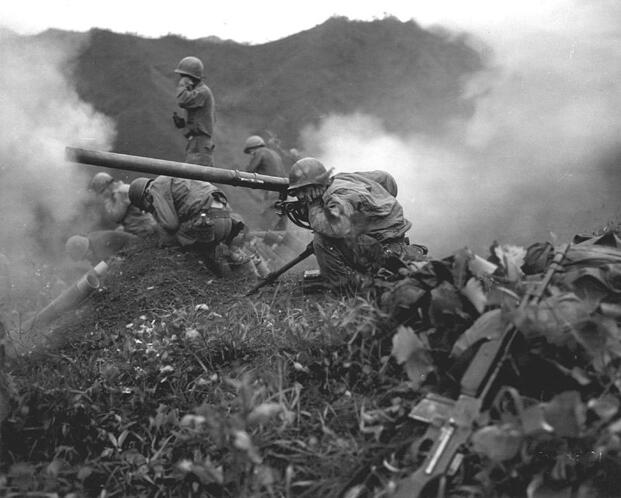Politics
Greek and American Troops Defend Outpost Harry Against 13,000 Chinese Soldiers

The eight-day battle for Outpost Harry in June 1953 showcased the extraordinary resolve of American and Greek troops against overwhelming Chinese forces. Capt. Martin Markley, commanding around 150 soldiers from K Company of the 15th Infantry Regiment, anticipated an assault after intelligence indicated that approximately 13,000 Chinese soldiers were preparing for an offensive. The situation escalated dramatically on June 10 when Chinese artillery began bombarding the outpost, unleashing over 20,000 shells that turned the landscape into chaos and destruction.
American forces were stationed at Outpost Harry, a strategic hilltop located within Korea’s Iron Triangle, a vital area for controlling access to Seoul. The outpost, situated just 425 yards from the Main Line of Resistance, was vulnerable to attack. Markley’s men had fortified their position with a network of trenches and bunkers designed to offer some protection against enemy fire. As the first night of combat unfolded, Chinese soldiers overran American defenses, leading to fierce close-quarters combat.
Throughout the intense fighting, American soldiers displayed exceptional bravery. Cpl. Donald L. Menken was reported missing after being hit by artillery fire, and Sgt. Ola Mize became a hero after single-handedly repelling an enemy assault on a machine-gun nest, for which he later received the Medal of Honor. Despite sustaining multiple injuries, Mize continued to defend his comrades, embodying the spirit of perseverance that characterized the battle.
Continuous Assaults and Rotating Forces
Chinese forces returned night after night, escalating their attacks while American commanders rotated fresh companies to the outpost to maintain the defense. Each day, the beleaguered troops received resupply and evacuation, only to face renewed assaults as night fell. The Americans’ resilience was evident as they repeatedly repelled overwhelming numbers of Chinese soldiers, inflicting heavy casualties.
Pfc. Charles Johnson displayed extraordinary courage during one of these assaults. After being injured, he prioritized aiding his comrades over his own safety, ultimately sacrificing his life while attempting to defend his position. His actions not only saved numerous lives but also earned him a Silver Star, later upgraded to the Medal of Honor.
The situation at Outpost Harry became increasingly dire as losses mounted. U.S. forces needed reinforcements, prompting American commanders to request assistance from the Greek Expeditionary Force, whose battalion had a storied history of fighting alongside U.S. troops since December 1950.
The Greek Expeditionary Force Joins the Fight
Arriving at Outpost Harry around June 16, Greek soldiers from Company P were determined to uphold their proud lineage. The battalion, named after the Spartans, drew parallels to the historic Battle of Thermopylae. As they took over the outpost, they fortified positions and prepared for the inevitable assault.
On June 17, Chinese commanders launched a final attack with nearly 3,000 soldiers. The Greeks, alongside American forces, engaged in brutal hand-to-hand combat, refusing to cede ground. Their counterattacks drove back the enemy, while American artillery decimated reinforcements attempting to breach the defenses. After hours of ferocious fighting, the Chinese forces withdrew, marking the end of their campaign to capture Outpost Harry.
The cost of this battle was staggering. Over eight days, Chinese forces fired more than 88,000 artillery rounds against the outpost, while American and Greek artillery returned fire with 368,000 rounds. Estimates indicate that around 4,200 Chinese soldiers were killed or wounded, while Allied forces suffered 102 fatalities and hundreds of injuries. The Greek battalion alone recorded 15 killed and 36 wounded.
For their actions, five U.N. companies received Presidential Unit Citations, a recognition of their collective valor during the battle. The American units honored included Companies K, B, and A of the 15th Infantry Regiment, as well as Company F of the 65th Infantry Regiment.
The battle for Outpost Harry was significant not just for its immediate tactical outcome but also for its impact on the broader context of the Korean War. As negotiations for an armistice were underway at Panmunjom, the defense of Outpost Harry ensured that U.N. forces retained a favorable position. The fighting at the outpost occurred at a critical juncture, with both sides suffering heavy casualties as they sought to gain leverage in negotiations.
On July 27, 1953, the armistice came into effect, officially ending hostilities. The defense of Outpost Harry remains a testament to the bravery and sacrifice of those involved, with legacies enduring long after the last shots were fired. Sgt. Ola Mize continued to serve in the military, eventually retiring as a colonel, while Pfc. Charles Johnson’s heroism was recognized by President Joe Biden in 2025. Cpl. Donald L. Menken’s remains were finally identified and repatriated in 2022, ensuring that his memory would live on in his hometown.
Today, the site of Outpost Harry lies within the Demilitarized Zone, a reminder of the fierce battles fought and the enduring human spirit in the face of overwhelming odds.
-

 Science1 month ago
Science1 month agoIROS 2025 to Showcase Cutting-Edge Robotics Innovations in China
-

 Science2 weeks ago
Science2 weeks agoUniversity of Hawaiʻi at Mānoa Joins $25.6M AI Initiative for Disaster Monitoring
-

 Lifestyle1 month ago
Lifestyle1 month agoStone Island’s Logo Worn by Extremists Sparks Brand Dilemma
-

 Health1 month ago
Health1 month agoStartup Liberate Bio Secures $31 Million for Next-Gen Therapies
-

 World1 month ago
World1 month agoBravo Company Veterans Honored with Bronze Medals After 56 Years
-

 Politics1 month ago
Politics1 month agoJudge Considers Dismissal of Chelsea Housing Case Citing AI Flaws
-

 Lifestyle1 month ago
Lifestyle1 month agoMary Morgan Jackson Crowned Little Miss National Peanut Festival 2025
-

 Health1 month ago
Health1 month agoTop Hyaluronic Acid Serums for Radiant Skin in 2025
-

 Science1 month ago
Science1 month agoArizona State University Transforms Programming Education Approach
-

 Top Stories1 month ago
Top Stories1 month agoIndonesia Suspends 27,000 Bank Accounts in Online Gambling Crackdown
-

 Sports1 month ago
Sports1 month agoMel Kiper Jr. Reveals Top 25 Prospects for 2026 NFL Draft
-

 Business1 month ago
Business1 month agoTruist Financial Increases Stake in Global X Variable Rate ETF









